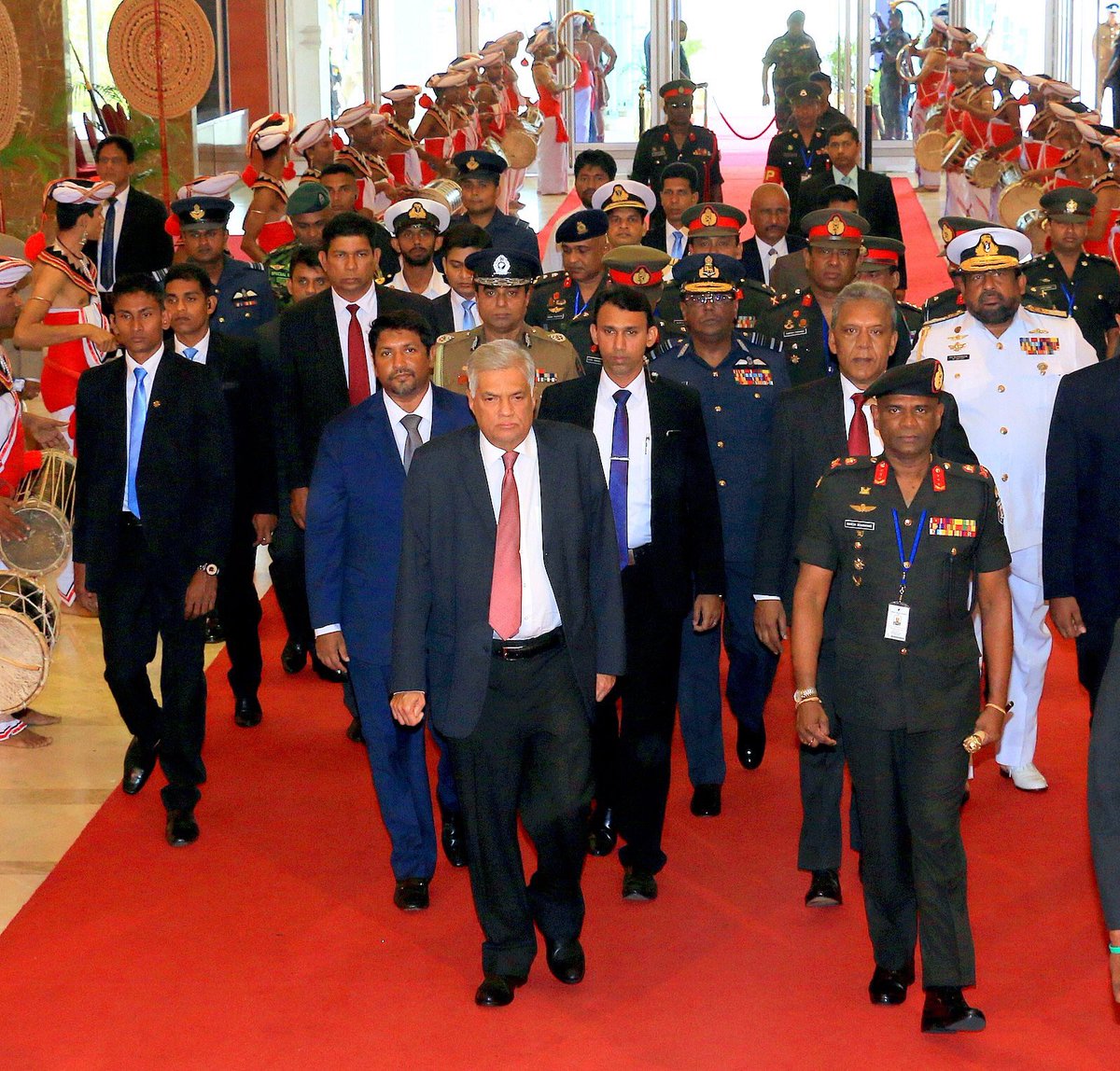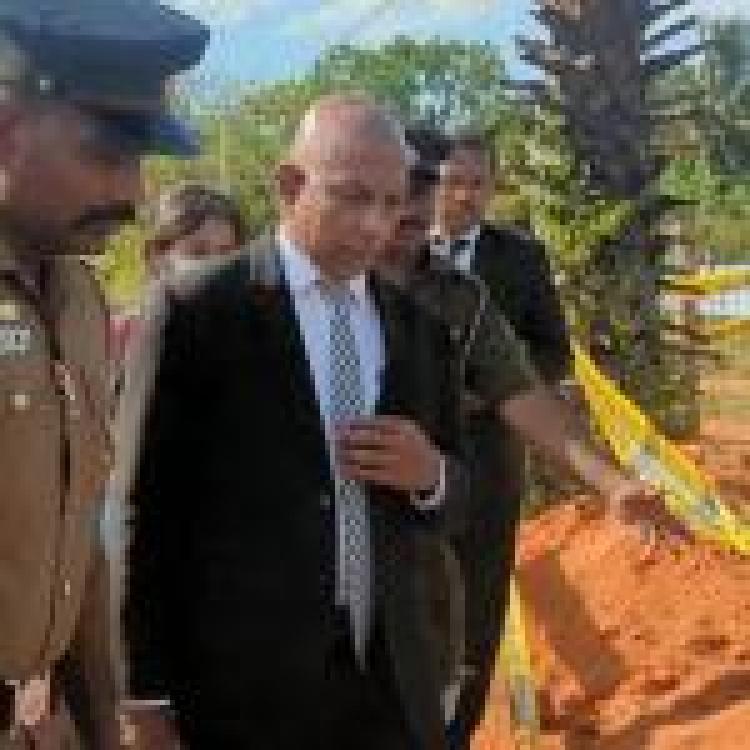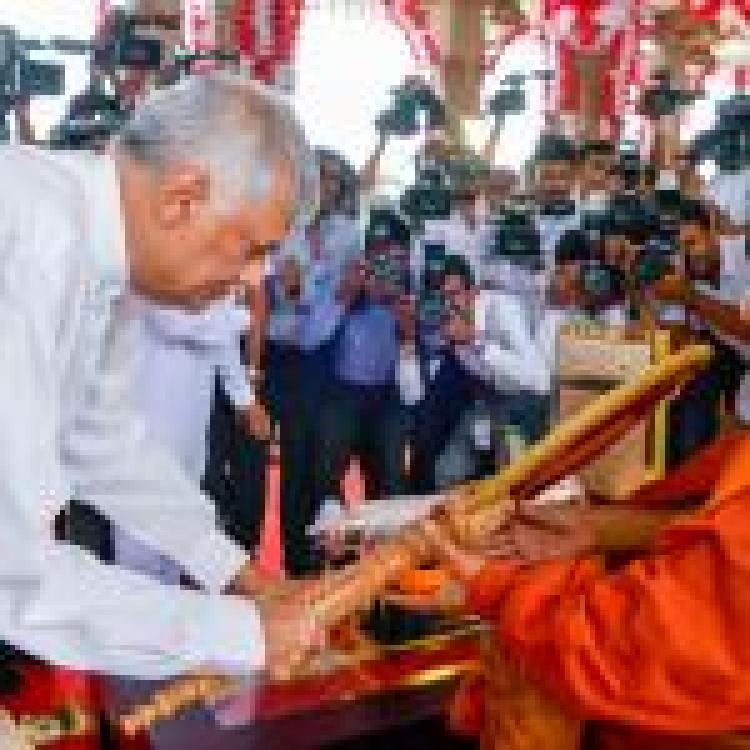
Wickremesinghe alongside senior Sri Lankan military leaders, including those accused of war crimes.
Though Sri Lanka’s sweeping aragalaya protest moment that forced its then-president out of office is now over, long-awaited reforms on the island have not taken place. Instead, Colombo’s latest president, the purportedly Western-friendly president Ranil Wickremesinghe, has proceeded to slide the island further down the path of authoritarianism. In recent months, as part of a bid to crush domestic and deflect foreign criticism, his government has looked to pass two items of legislation – the Online Safety Bill and the Anti-Terrorism Bill. Both must immediately be halted.
In presenting the Online Safety Bill, Sri Lanka’s Public Security Minister faced a torrent of criticism from across the aisle. Opposition MP, and former ally to Sri Lanka’s president, MP Harsha De Silva, described the move as “unfathomable” and claimed it was out of the character for Wickremesinghe. However, this march towards authoritarianism is deeply rooted in the island’s history and is embedded within the ideology of Sinhala Buddhist nationalism. Indeed, it is a politics that for decades has driven Wickremesinghe, like it did those before him.
The Online Safety Bill has been rightfully criticised for its deliberate vagueness. The Bill purports to be safeguarding individuals “against damage caused by communication of false statements or threatening, alarming or distressing statements”. In an era of misinformation and instant social media, a carefully considered move along those lines may be welcome. However, this bill is both blunt and menacing. It fails to define what such statements may be and instead envisions a five-member Online Safety Commission which would establish these terms and would be directly appointed and dismissed by Sri Lanka’s president.
Commentators in the South of the island have rightfully noted Wickremesinghe’s track record of cracking down on anti-government demonstrators, trade union leaders, and student protesters. The early weeks of his rule serve as painful reminders.What has often been unstated, however, is how this legislation will deliberately further entrench power for Sinhala Buddhist ideologues.
A key aspect of the bill is to criminalise “offense to religious feelings”. Yet on the island, only one religion continues to reign supreme. Sri Lanka has already seen the detention of comedians, poets, authors and even tourists who were deemed to have criticised or even poked fun at Buddhism or its ideology. This bill will grant authorities even more power to detain people over such perceived infarctions. The proposal of the legislation comes at an even more distressing period.

Wickremesinghe with a Sinhala Buddhist monk.
Across the Tamil homeland, Buddhist extremists and their patrons are feeling increasingly emboldened to desecrate Hindu temples and erect their own shrines in place. Last month, a Mullaitivu judge, T. Saravanarajah, was forced to flee the island after repeated threats to his life after ruling against the Sri Lankan government’s occupation of a site in Kurunthumalai. With the aid of Sri Lanka’s military, the site was used against court orders to erect a Buddhist monument on Tamil land and actively barred Tamil worshippers from accessing their temple. Muslims and Christians too are repeatedly under attack.
Under the pretence of safeguarding against religious offences, Wickremesinghe has proposed the Online Safety Bill. However he has repeatedly shown fidelity to Buddhist extremists. For example, in 2018, his party pledged to build a thousand viharas in the Tamil homeland. Given this unreserved acceptance of Sinhala Buddhist chauvinism, there is little doubt as to how this legislation will be wielded.
Furthermore, the Online Safety Bill cannot be uncoupled from the proposed Anti-Terrorism Bill, which aims to replace Sri Lanka’s draconian Prevention of Terrorism Act. Both bills were introduced on the same day after all.
The Anti-Terrorism Bill has similarly been slammed by human rights defenders for its overly broad definitions and the wide range of powers given to the military - to stop, question, and search, and to arrest and detain people, with inadequate judicial oversight. In addition to empowering the military, it enables Sri Lanka’s president to declare any location a “prohibited place”, with up to three years in prison for violators, and broadens the power to criminalise speech that may be seen as encouragement or inducement to commit or prepare for terrorism.
Human Rights Watch notes that this may be used to deliberately target Tamil survivor communities who continue to commemorate the sacrifices of their loved one on social media. In the past, Sri Lankan police have targeted Tamil youth for “LTTE social media posts” as well Muslims for criticism of the Sri Lankan military. Human Rights Watch has also highlighted how the government has proscribed Tamil diaspora organisations that have advocated for human rights and accountability as “terrorist organisations”. The Online Saftey Bill deliberately details that it may target “Any person, whether in or outside Sri Lanka, who poses a threat to national security […] by communicating a false statement, commits an offence”. Both bills together are not just dangerous; they are deadly.
The move to pass these bills by Sri Lanka’s government is not novel. Indeed, it follows a well-trodden path of authoritarianism that grants Sri Lanka’s president and military the power to crush dissent, when the situation requires. Whilst the island and its present may attempt to continue its façade of liberalism and democracy, Sri Lanka is instead teetering towards another cycle of vicious totalitarian control. If it is not stopped, it will be the island’s Tamils and Muslims, who will once more bear the brunt of it.


